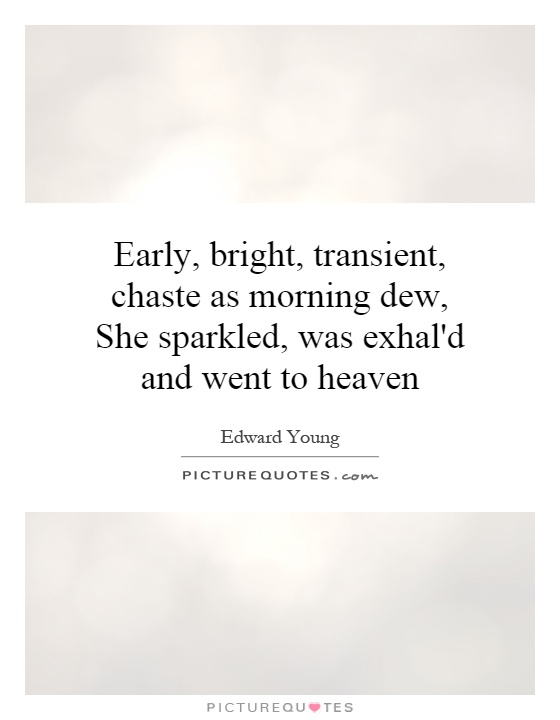Early, bright, transient, chaste as morning dew, She sparkled, was exhal'd and went to heaven

Early, bright, transient, chaste as morning dew, She sparkled, was exhal'd and went to heaven
Edward Young was an English poet and playwright who lived during the 18th century. He is best known for his work "Night Thoughts," a long poem that explores themes of death, mortality, and the afterlife. In this context, the line "Early, bright, transient, chaste as morning dew, She sparkled, was exhal'd and went to heaven" can be seen as a reflection of Young's preoccupation with the fleeting nature of life and the inevitability of death.The image of something or someone being "early, bright, transient, chaste as morning dew" evokes a sense of purity and innocence, as well as a sense of transience and impermanence. The comparison to morning dew, which is delicate and ephemeral, suggests that the subject of the line is young and beautiful, but also fragile and fleeting. The use of the word "chaste" further emphasizes the purity and innocence of the subject, suggesting that she is untainted by the corruption and decay of the world.
The line also conveys a sense of suddenness and unexpectedness, as the subject is described as being "exhal'd and went to heaven." The use of the word "exhal'd" suggests a sudden departure or release, as if the subject's life was suddenly extinguished like a breath of air. The image of the subject ascending to heaven further emphasizes the idea of transcendence and spiritual elevation, suggesting that she has been taken up to a higher plane of existence.
Overall, this line from Young's work can be seen as a meditation on the fleeting nature of life and the inevitability of death. It conveys a sense of beauty, purity, and innocence, but also a sense of transience and impermanence. In the context of Young's larger body of work, this line serves as a poignant reminder of the fragility of human existence and the need to contemplate the deeper mysteries of life and death.












 Friendship Quotes
Friendship Quotes Love Quotes
Love Quotes Life Quotes
Life Quotes Funny Quotes
Funny Quotes Motivational Quotes
Motivational Quotes Inspirational Quotes
Inspirational Quotes